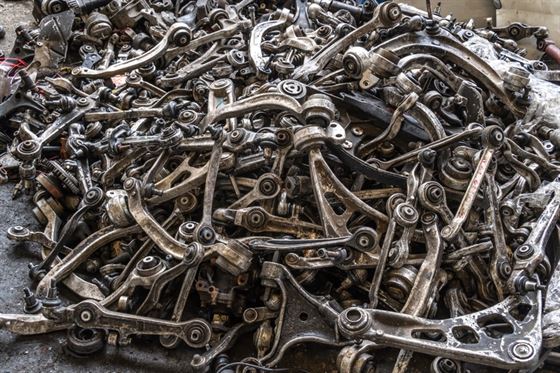Metals can be split into three main categories: ferrous, non-ferrous, and alloys. Most of us know what alloys are, but people often confuse ferrous and non-ferrous metals. If you’re interested in learning the differences between the two and what each can be used for, keep reading.
What Is A Ferrous Metal?
Ferrous metals are those that contain iron and steel. They are typically magnetic and have high tensile strength, a good level of hardness, and increased durability. Ferrous metals are commonly used in construction, automobile manufacturing, industrial-scale piping, railway tracks, and domestic applications.
What Is A Non-Ferrous Metal?
Non-ferrous metals don’t contain iron. As a result of this, they are relatively light and malleable; however, they retain a good amount of strength and are more resistant to corrosion than ferrous metals. Non-ferrous metals have a broad spectrum of uses, including in the manufacturing of aircraft and for making things like golf clubs.
The Properties Of Ferrous & Non-Ferrous Metals
Ferrous and non-ferrous metals have their own unique properties that contrast with each other. Those properties include:
· Cost – generally speaking, non-ferrous metals are more expensive than ferrous metals because they have more uses and are therefore in higher demand; however, they’re slightly more difficult to source than ferrous metals.
· Weight – ferrous metals contain iron and steel and are therefore heavier and less malleable than non-ferrous metals.
· Recycling – ferrous and non-ferrous metals can both be recycled. Non-ferrous metals can be used time and again because no chemical properties are lost during the process. Paired with their scarcity, it’s important to recycle all unused or unwanted metals.
· Magnetic properties – ferrous metals are magnetic and this is what makes them so suitable for use in the automotive and electrical appliance industries. On the other hand, non-ferrous metals are not magnetic which makes them best suited for wiring and electrics.
· Rust & corrosion – ferrous metals are susceptible to rust and corrosion due to the high carbon content within them. In contrast, non-ferrous metals have no iron in them which makes them highly resistant to rust and corrosion.
Examples Of Ferrous Metal & What Are They Used For?
The most common and widely used types of ferrous metals are steel, cast iron, and wrought iron. Steel is incredibly strong and machinable, making it a staple in the construction and manufacturing industries.
Cast iron is a hard metal. Unlike other ferrous metals, it is more resistant to corrosion than steel which makes it a common choice for making things like industrial pipes, machine tools, and cookware like cast iron pans and skillets.
Wrought iron has a high iron content which means that, unlike other ferrous metals, it’s more resistant to corrosion. As a result, wrought iron is a popular choice for fences and rails.
Recycling Ferrous Metal
Ferrous metals are highly recyclable and can be melted down and made into something new without having to create more. This is highly efficient and cost-effective, and it’s also more sustainable because it keeps perfectly usable metals out of landfills. If you have any ferrous metals you want to recycle, Jarvis & Sons can help. We are experts in scrap metal recycling and provide a fast, high-quality, reputable ferrous metal recycling service. To find out more, please contact us.

